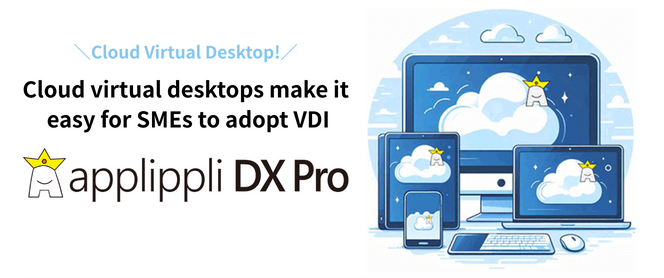What are the security risks of BYOD? Safely use your own device for work!

Do you know about BYOD?
BYOD is an abbreviation for Bring Your Own Device, and refers to using a personal device for work. By using personal devices when working at the workplace or school, users can work on familiar devices, and companies and organizations can reduce implementation costs, which is why many companies and organizations are introducing BYOD.
However, this convenient BYOD also has a big pitfall: security risks. Especially in the case of corporate enterprises, if confidential company information is made accessible on employees’ personal devices through BYOD, it is not surprising that the confidential information could be leaked at any time.
Therefore, those who are considering introducing BYOD must first address security measures.
In this article, we will discuss BYOD and introduce recommended services to reduce security risks.
Table of Contents ┗Merits of BYOD What are the security risks of BYOD? |
Recommended BYOD security solutions |
This service is a cloud-based VDI (DaaS) service that allows you to operate virtual desktops without server management. This “applippli DX Pro” is a cloud-based VDI that does not require a server, so even those without specialized knowledge can easily use virtual desktops. By using VDI with BYOD, you can work remotely or on the go without VDI data remaining on the BYOD device, reducing security risks. |
What is BYOD?
BYOD (Bring Your Drive) refers to using personal devices for work. This initiative has been attracting attention in the context of telework and working from home, and many companies are introducing it in today’s world where optimization and efficiency of work is required.
Merits of BYOD
BYOD has the following merits.
Utilizing multiple devices Cost reduction Users can use their favorite devices for work |
Utilizing multiple devices
By introducing BYOD, users can use their favorite devices for work. For example, if they can use tablet devices such as iPads for work, they can work intuitively, and if they can work on their smartphones, they can work during their travel time.
Cost reduction
Companies and organizations no longer need to prepare devices for users, which leads to cost reduction.
Users can use their favorite devices for work
Users can work on the device they normally use or the device of their choice, so they can work on the device they are accustomed to using. This means they no longer need to have two computers, one for work and one for personal use, and can shorten the time it takes to start working.
What are the security risks of BYOD?
As explained above, BYOD has many mrtits.
On the other hand, it has a demerit, which is the increased security risk. We will explain three ways in which the introduction of BYOD increases security risks.
| BYOD security risks |
Information leakage Loss of device Virus infection |
Information leakage
BYOD is a system that allows employees to use their personal devices at work, so they take company data outside on a daily basis, increasing the possibility of information leakage. In addition, because employees connect to Wi-Fi and work in various locations, there is a risk that information may be stolen in various locations.
Loss of device
If you lose your device, not only will you lose your data, but there is also the possibility that an outsider could gain unauthorized access to your computer and extract information. For this reason, we recommend using cloud services or implementing multi-factor authentication on your computer.
Virus infection
Personal devices are less likely to be infected with viruses than company devices. For this reason, it is necessary to take sufficient measures and mechanisms when introducing BYOD.
Introducing services that address the security risks of BYOD
To reduce the security risks of BYOD, we recommend introducing mechanisms and services that do not leave data on personal devices. Typical examples are VDI and remote desktop services. These services refer to a mechanism whereby each device accesses and operates a desktop environment located in a remote location, such as a server. By utilizing this mechanism, work can be done without leaving data on the devices used under BYOD.
Also, for those who do not have specialized knowledge of server management, we recommend using cloud VDI (DaaS). Cloud VDI (DaaS) is a service that allows you to operate VDI without server management, and anyone can easily use VDI. Furthermore, it supports multiple devices, and the screen you are viewing on your desktop can be operated on a tablet device, allowing you to work seamlessly.
The recommended cloud VDI (DaaS) service is “applippli DX Pro”.
Lastly
BYOD is a convenient system that has merits for both companies and organizations and users. On the other hand, it also increases security risks, so it becomes necessary to address security measures. By utilizing BYOD while reducing security risks and working efficiently, you can eliminate waste and optimize your work.
Also, if you want to introduce cloud VDI (DaaS) and reduce the security risks of BYOD, we recommend applippli DX Pro.

